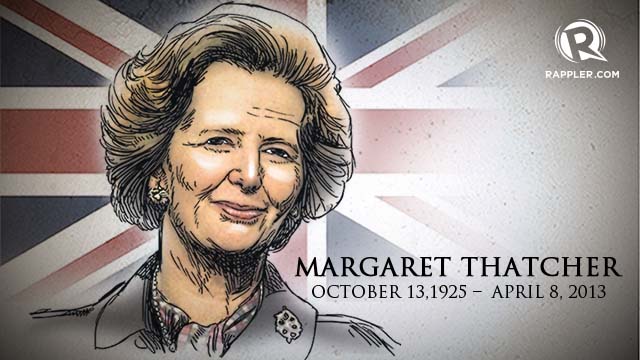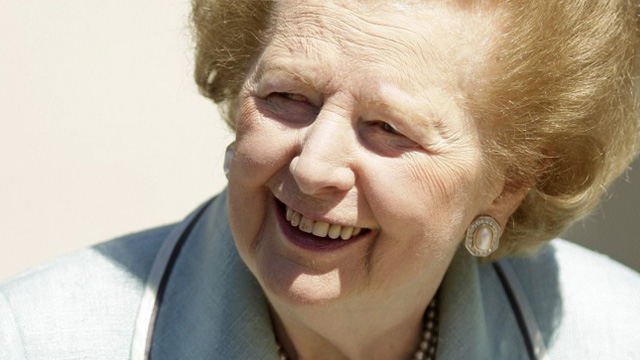SUMMARY
This is AI generated summarization, which may have errors. For context, always refer to the full article.

LONDON, United Kingdom (4th UPDATE) – Former prime minister Margaret Thatcher, the controversial “Iron Lady” who shaped a generation of British politics, died following a stroke on Monday at the age of 87, her spokesman said.
Queen Elizabeth II and Prime Minister David Cameron led tributes to Britain’s first woman premier, a right-wing titan and key figure in the Cold War.
“It is with great sadness that Mark and Carol Thatcher announced that their mother Baroness Thatcher died peacefully following a stroke this morning,” spokesman Lord Tim Bell said, referring to Thatcher’s children.
The former premier, who led Britain from 1979 to 1990, suffered from dementia and has appeared rarely in public in recent years.
She was last in hospital in December for a minor operation to remove a growth from her bladder.
The former Conservative Party leader remains the only female premier in British history and was the 20th century’s longest continuous occupant of Downing Street.
Her daughter once revealed that the former premier had to be repeatedly reminded that her husband Denis had died in 2003.
She was told by doctors to quit public speaking a decade ago after a series of minor strokes.
“The Queen was sad to hear the news of the death of Baroness Thatcher. Her Majesty will be sending a private message of sympathy to the family,” Buckingham Palace said.
Cameron said: “It was with great sadness that I learned of the death of Lady Thatcher. We have lost a great leader, a great Prime Minister and a great Briton.”
Michael Howard, Conservative leader from 2003-2005, told Sky News television: “It’s terribly sad news. She was a titan in British politics.
“I believe she saved the country, she transformed our economy and I believe she will go down in history as one of our very greatest prime ministers.”

‘Ceremonial’ funeral, not state funeral
Thatcher will get a ‘ceremonial’ funeral with full military honors, not a state funeral, Downing Street announced.
“Downing Street can announce that, with The Queen’s consent, Lady Thatcher will receive a Ceremonial funeral with military honours. The service will be held at St Paul’s Cathedral,” Cameron’s office announced.
A private cremation would follow later, it said.
Cameron also cut short a trip to Europe on Monday, where he was lobbying EU leaders about reform, following her death, Downing Street said.
“Yes he is cutting short his trip. He’s returning from Madrid, he’s expected back later today,” a Downing St spokesman told AFP.
Cameron was in Madrid for talks with Spanish premier Mariano Rajoy. He had been due to travel to Paris on Monday evening for talks with French President Francois Hollande but Downing Street confirmed that had now been postponed.

Thatcherism, Reagan ties
Right-wingers hailed Thatcher as having hauled Britain out of the economic doldrums but the left accused her of dismantling traditional industry, claiming her reforms helped unpick the fabric of society.
On the world stage, she built a close “special relationship” with US president Ronald Reagan which helped bring the curtain down on Soviet Communism. She also fiercely opposed closer ties with Europe.
Thatcher was born Margaret Hilda Roberts on October 13, 1925 in the market town of Grantham, eastern England, the daughter of a grocer.
After grammar school and a degree in chemistry at Oxford University, she married businessman Denis in 1951 and two years later had twins, Carol and Mark.
She was first elected to the House of Commons in 1959 and succeeded former prime minister Edward Heath as opposition Conservative leader in 1975 before becoming premier four years later.
Her enduring legacy can be summed up as “Thatcherism” — a set of policies which supporters say promoted personal freedom and broke down the class divisions that had riven Britain for centuries.
Pushing her policies through pitched Thatcher’s government into a string of tough battles, though.
When Argentina invaded the remote British territory of the Falkland Islands in 1982, Thatcher dispatched troops and ships, securing victory in two months.
Read more about her life and legacy here. – Rappler.com
Add a comment
How does this make you feel?
There are no comments yet. Add your comment to start the conversation.